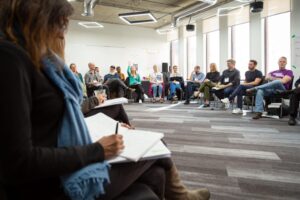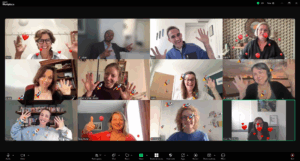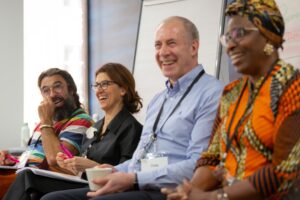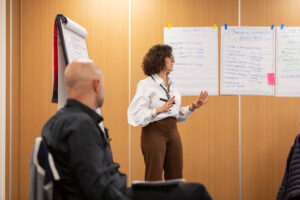As Easter approaches, many of us begin to plan for the time away from work, school, and regular routines. Whether you’re preparing for quality family time, gathering with friends, or perhaps enjoying some well-needed time to yourself, this holiday season presents a chance to reflect, recharge, and strengthen relationships. But what if this Easter could be more than just a break from routine? What if it could be an opportunity to deepen the connections that matter most?
By applying the principles of Organisation and Relationship Systems Coaching (ORSC), we can approach this holiday season with a fresh perspective, creating meaningful experiences that honour ourselves and others. Whether you’re navigating family dynamics, spending time with friends, or embracing time alone, a relational approach can help you make the most of this time together.
1. Setting Intentions: Designing the Easter Experience
The foundation of any successful relationship is alignment—understanding and agreeing on shared goals and expectations. Before the holiday rush sets in, consider having a conversation with your family, friends, or housemates about how you want to experience Easter.
This can be done through the Designing Team Alliance (DTA) tool from ORSC. It’s a great way to ensure everyone’s needs are met while creating a shared vision for the holiday. Ask questions like:
- What do we want this Easter to feel like?
- How can we balance everyone’s individual needs and desires with the group’s collective experience?
Having this conversation early gives everyone the space to voice expectations and desires—creating alignment before the holiday truly begins. Whether it’s planning a quiet day, a festive meal, or an outdoor adventure, co-creating the experience will help make the holiday more meaningful for all involved.
2. Navigating Different Perspectives and Needs
When family, friends, and loved ones come together, differences in traditions, expectations, and personalities can create tension. One family might prioritise religious services, another may want a relaxed afternoon, and some may simply want to be left to enjoy their time in their own way.
This is where Relationship Systems Intelligence (RSI™) comes into play. RSI helps you become more aware of your relational dynamics by understanding how people interact within a system. By using RSI, we approach every person’s viewpoint with curiosity and respect, recognising that different people can have different needs.
For example, ask yourself:
- What does Easter mean to each person involved?
- How can I create space for everyone’s perspective, even if I don’t agree with it?
By holding this mindset, we can manage differences more effectively and avoid friction. Whether it’s respecting someone’s quiet time or accommodating another person’s need for connection, being aware of the system at play will help you adapt with empathy and patience.
3. Managing Family and Group Energy
One powerful concept in ORSC is the Emotional Field, which refers to the collective energy and emotions within a group. At family gatherings or large social events, emotions can shift quickly—one comment might trigger laughter, while another might spark tension.
It’s important to stay attuned to the group energy and navigate it consciously. You can do this by regularly checking in with yourself and others:
- How is the energy in the room?
- Are people feeling relaxed and connected, or are there signs of discomfort or strain?
When tensions rise, use the Bilateral Ventilation tool. In situations where someone’s emotions may be bubbling over, have them share their feelings with the group or coach before addressing the issue directly. This prevents escalation and gives space for people to express themselves calmly. The coach or leader can act as a neutral facilitator, allowing the conversation to unfold in manageable, bite-sized exchanges.
4. Embracing Conflict as an Opportunity for Connection
It’s inevitable: family and group dynamics sometimes lead to disagreements. Rather than viewing conflict as a negative, it can be an opportunity to strengthen the relationship by finding new ways to connect and compromise.
In ORSC, Alignment Coaching is the tool for transforming conflict into shared understanding. Instead of focusing on positions (the specific solutions each person wants), alignment coaching asks, What common values or interests do we share?
For example, two people may disagree on how to spend the day, but their shared value might be creating a meaningful experience for the family. Shifting the focus from disagreement to alignment helps create a bridge between conflicting parties. Ask:
- What do we agree on?
- What is the larger goal or value that we’re working toward?
By redirecting focus to common interests, even challenging conversations can create connection rather than division.
5. Taking a Systemic Approach to Solo Time
While Easter often revolves around family or social gatherings, it’s equally important to honour time alone. Taking the opportunity to connect with yourself is crucial for personal well-being and emotional health.
ORSC’s Third Entity tool is helpful when reflecting on time spent alone. Consider your relationship with your personal space—what does your time alone represent for you? What are your personal needs, desires, and boundaries during the break?
Another key ORSC principle is the Original Myth—the stories we tell ourselves about who we are and how we spend our time. Perhaps you feel guilty about taking time for yourself, or maybe you feel like you need to “perform” during the holiday to please others. Recognise these narratives and ask:
- What do I need from this solo time to recharge and feel fulfilled?
- How can I honour myself while also being available to others when needed?
Taking time to rest and rejuvenate is a crucial part of creating a balanced, relational approach to Easter.
6. Closing: Reframing Easter as a Relational Opportunity
By applying the principles of ORSC, you can approach this Easter with intentionality and mindfulness, ensuring that the time spent with others (or alone) is meaningful and aligned with your core values. As we reflect on our relationships, let’s take the time to design our holiday experience intentionally, manage energy consciously, and embrace conflict as an opportunity for connection.
This Easter, whether you’re spending time with family, friends, or by yourself, apply a relational approach to create lasting, positive memories. Consider how the tools of ORSC can deepen your connections and help you cultivate a holiday that truly honours both yourself and others.
How will you approach Easter differently this year?






